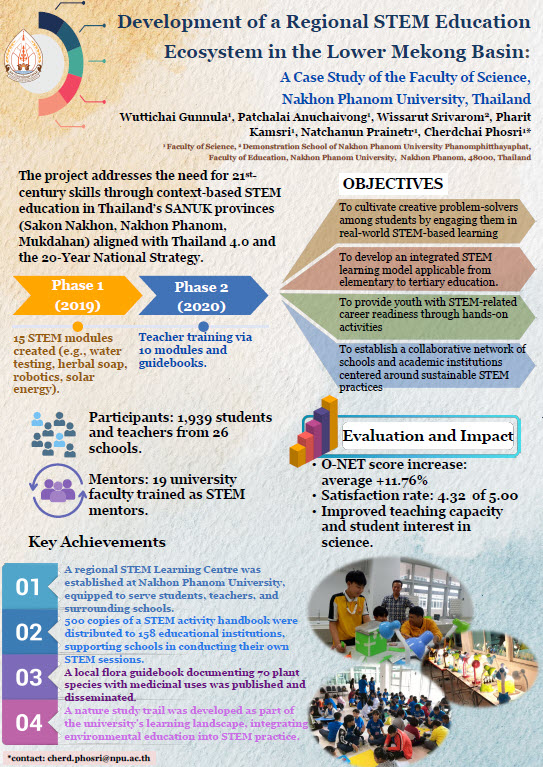Development of a Regional STEM Education Ecosystem in the Lower Mekong Basin
A Case Study of the Faculty of Science, Nakhon Phanom University, Thailand
Keywords:
STEM education, STEM school-university collaboration, teacher development, school-university collaboration, problem-based learning, Mekong subregionAbstract
STEM education plays a crucial role in equipping youth and educators with essential 21st-century skills, particularly in regions with unique socio-geographical contexts such as Thailand's upper northeastern provinces and the Lower Mekong subregion. The Faculty of Science at Nakhon Phanom University has actively contributed to regional STEM development by implementing a sustained model that integrates curriculum innovation, teacher capacity building, and community-based educational outreach. The initiative began in 2019 with the project “Capacity Building for Youth in the SANUK Provinces toward Excellence in Science and Technology through STEM Education,” developed in collaboration with the Institute for the Promotion of Teaching Science and Technology (IPST). This phase has produced 15 STEM activity modules for primary and secondary students. In its second phase, the project expanded to include teacher professional development under the title “Developing Model Schools and Master Teachers in STEM Education in the Lower Mekong Subregion,” has resulted in 10 additional training modules and instructional guidebooks. Over five years, these resources have been delivered to more than 80 partner school networks and have supported both student learning and pre-service teacher training in the university’s Bachelor of Education programs in Physics, Chemistry, and Biology. The project has resulted in the creation of an integrated three-tiered STEM education model: (1) student-focused, problem-based STEM learning; (2) teacher training and resource development; and (3) institutional collaboration through school-university networks. Current efforts aim to extend this model through international partnerships, notably with LUMA Centre Finland, to advance locally relevant, globally connected STEM education practices." (Hmelo-Silver, 2004)

Published
How to Cite
Issue
Section
URN
License
Copyright (c) 2025 Wuttichai Gunnula, Patchalai Anuchaiwong, Wissarut Srivarom, Pharit Kamsri, Natchanun Painetr, Cherdchai Phosri

This work is licensed under a Creative Commons Attribution 4.0 International License.




